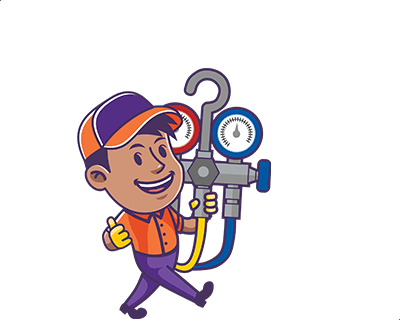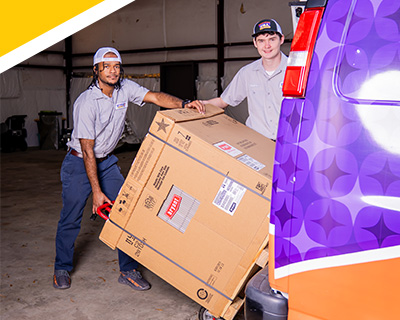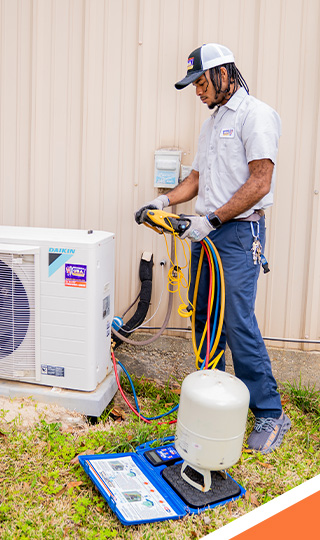
Denham Springs Heating Repair
While Louisiana can be warm and humid in the summer, this does not mean that the winter season is any less brutal. Depending on the area, sleet and near freezing temperatures can be extremely common during this time of year. If your furnace or heating system is not functioning properly, this weather can make you feel miserable. Fortunately, our EPA-certified technicians can diagnose your heating problem and conduct lasting heating repairs.
The average lifespan of a well-maintained furnace is typically between 15 and 20 years. Repairs can extend the current lifespan of your heating system, allowing you to enjoy a warm, toasty home for nearly two decades. When you schedule furnace repairs with UBA Heating and Cooling, our contractors will inspect your air vents, ductwork, and compressor to diagnose your issue. Contact us today to schedule furnace repair service!
Our Values Serving Denham Springs, LA Since 2013
-
Certified & Qualified TechniciansOur technicians use the latest technology to tackle any heating and cooling project with precision and efficiency.
-
Free Estimates AvailableWe're happy to offer free estimates as well as second opinions on your HVAC needs.
-
Customer Care FocusedOur number one priority is to ensure you have an excellent experience with us from beginning to end.
-
Local & Family OwnedAT UBA Heating & Cooling, we extend our family values into our community & customers.



Our Heating Repair Process
At UBA Heating and Cooling, we understand that a heating breakdown can be a stressful experience, which is why we offer straightforward repairs that keep you informed and in control from the start of our process to the finish. When you choose us for your heating repairs, here is what you can expect the process to look like and how our process sets us apart.
- Free Second Opinions: If another company has quoted you a costly repair or an early replacement, you can contact us for a second opinion, and we will be happy to take a second look, free of charge. We want you to be able to make the most informed decision possible for your home without worrying about hidden fees or upselling.
- Service On A Variety Of Heating Systems: With our expertise and advanced tools, we can handle any heating system on your property. Whether it’s a modern heat pump or an older furnace, our technicians will thoroughly diagnose the issue to ensure the proper repair is made.
- Set You Up For Success: Our primary goal is to keep your home well-equipped to withstand Louisiana’s diverse weather conditions. With any heating service, we will inspect the rest of your HVAC system for safety and efficiency. For annual heating maintenance that helps keep issues at bay, we recommend becoming a Better Savings Club member.
-
What Are VOCs, And Why Are They Harmful?Volatile Organic Compounds (VOCs) are chemicals that easily evaporate at room temperature and are often found in paints, cleaning products, and adhesives. These compounds can be harmful as they contribute to indoor air pollution and can cause short-tern health effects, such as headaches, dizziness, and respiratory issues. Long-term exposure to these pollutants can lead to chronic health problems, such as liver and kidney damage. We recommend using low-VOC or VOC-free products to maintain a healthy indoor air quality.
-
Can A Whole House Purifier Help With Odors And Smoke?Yes, a whole-house air purifier can effectively address odors and smoke. These systems are designed to filter out a variety of airborne particles, such as smoke, pet odors, cooking smells, and other household odors. They usually feature activated carbon filters that absorb and neutralize odors, along with high-efficiency particulate air (HEPA) filters that trap smoke particles. By continuously circulating and purifying the air throughout your home, a whole-house air purifier can greatly enhance indoor air quality, creating a fresher and healthier environment for you and your family.
-
How Do Air Cleaners Compare, And Are There Guidelines For Comparison?When deciding which air cleaners are right for you, it’s essential to consider their effectiveness in reducing indoor air pollutants and potential health risks. We recommend looking for HEPA filters, which are designed to capture fine particles from the air, along with assessing the MERV rating, which indicates how efficient an air filter is. Guidelines for comparison include evaluating the cleaner’s ability to remove pollutants, its suitability for your space, energy efficiency, and noise levels.
-
How Often Should I Have My Heat Pump Serviced?Your heat pump should be serviced annually at a minimum. Bi-annual service is usually recommended, as heat pumps operate year-round. We recommend scheduling service in the early spring and early fall to help ensure the system is ready for the scalding Louisiana summers and harsh winters.

24/7 Emergency HVAC Services
Heating emergencies always seem to spring up at the most inopportune times. That’s why UBA Heating and Cooling offers 24/7 emergency HVAC repairs. Our trusted technicians can restore warm, comfortable air to your home.
We prioritize our customers’ safety and satisfaction. Whether it’s the weekend or the middle of the night, our team is always prepared to answer your call and provide fast, reliable service.

.2504222210461.jpg)

